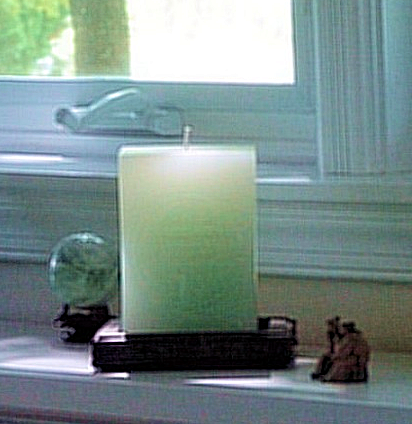Observe the knowing subject and the difference in quality that distinguishes it from the known object.
I chose an object across the room, a jade colored candle. As the knowing subject I observed how I felt about the object. I held affection for it, I recalled my origins and history with it, how I purchased it from Gump’s Department Store in San Francisco on a trip there with my wife decades ago. I associated happy memories with the object, I appreciated its aesthetics too, the pale green color was appealing, the Chinese markings on all four sides of the oblong object reminded me of my Eastern meditative practices, it stood on an attractive carved wooden stand. I never intended to put a flame to its white wick, it was always intended, as I looked outward, to sit ‘over there’, and be ‘pleasing‘ in a room with other pleasing objects. It was an object chosen by the knowing subject, to make ‘me‘ feel comfortable.
Let the object pole ‘over there’ be the knower, knowing you here as the thing known.
At first, I tried to shift my identity and human capacities to the candle, to impute imagined affection and history that the candle might have for me as it sat there observing days turning into night, of a person coming into the room, over there, sitting in a chair, turning on a laptop with his feet up, and tapping fingers on a keyboard. But then I dropped that and just let myself be the inanimate object. What would that be like? I felt or observed nothing.
But then I dropped imagining the object and realized I was really observing my ‘ideas about’ the object, I was observing an image of the candle, not outward, but ‘here‘. When that happened there was no intervening distance between the object and the subject, they had merged. Then, I felt the object as the subject, if I’m saying that correctly. I became the paraffin, the pigment, there was just exploring the candle from within, the depth of white wick, there seemed to be nothing about the candle that I could not be, there were no boundaries. There was something sitting over there, but everything about it was here, and it was not hard edged or fixed, it was open and spacious, light and airy.


Hi David,
I’m now reading two books by people who suffered strokes to their left hemisphere (the hemisphere that allows us to use language, identify objects and people, and navigate in the world): Jill Bolte Taylor’s “My Stroke of Insight” and Ram Dass’s “Still Here”. In both cases their descriptions of a blissful realm in which neither linear time nor physical separation intrude, provides a beautiful account of a greater time, space and knowledge of oneness. But both of them also needed to struggle against becoming lost in this holistic, undifferentiated state of mind, if they were to have any hope of ever again speaking, walking, or recognizing other human beings.
I guess I should be grateful that I haven’t experienced loved ones “slipping away from familiar structures” due to a stroke. Although my father died suddenly from one. I’m driven to read about it because I have a fictional character whose experience I need to make more realistic.
It’s interesting to see the parallels between the TSK vision and the experience of left-brain trauma. It helps me to realize that I need to remain grateful for an embodied life in the world which I could not have without a functioning left brain, but that there are people who have given eloquent testimony to the left right brain’s capacity to directly perceive Great Time, Great Space, and Great Knowledge. However without a functioning left brain they cannot share it, remember it, or keep themselves alive to live it. — Michael
Hi Michael,
I remember reading about this book, and I remember imagining how horrifying that slipping-away feeling of familiar structures, the helplessness of being swept further and further out to sea. Still gives me chills since I’ve now witnessed it with two loved ones.
I read Bruce’s pointing-out question to Caroline in her Practice of this exercise. Very masterful I thought. His question is the essence of open inquiry, referring to the gap, — for instance when I attempted to know the object ‘without’ imagining human imputed faculties to an inanimate object, I came up with nothing, and then moved on. Because I’m used to finding ‘nothing’ useless. But, of course, nothing is NOT useless. What happens when you become the gap or nothing? Everything changes. It’s like a clearing wind blowing through the structuring clouds making them transparent, and for an instant you are the zero-point. There’s a sense of knowing the space of knowing.
David
David,
I always enjoy reading about your experiences of being present. I spent a little time this morning with this exercise and remained with the warm-up: feeling the difference between the subject here and the object there. Somewhat paradoxically, I felt how even the process of observation is an act of intimacy and kinship with the realm that offers itself for observation. The clock ticking surprising loudly–surprising because I am usually quite unaware of it’s cadenced melody. I turned to this exercise after reading in a book titled “My Stroke of Insight” about a neuropsychologist’s experience of her own right hemisphere stroke. Her description of how the trauma to her right brain left these blissful holistic feelings, while orientation in linear time and surrounding space was slipping out of reach, caused me this morning to feel grateful for having both modalities operating in me this morning. I could feel the wholeness of which I am a part and also appreciate the network of connections joining elements of that wholeness. — Michael